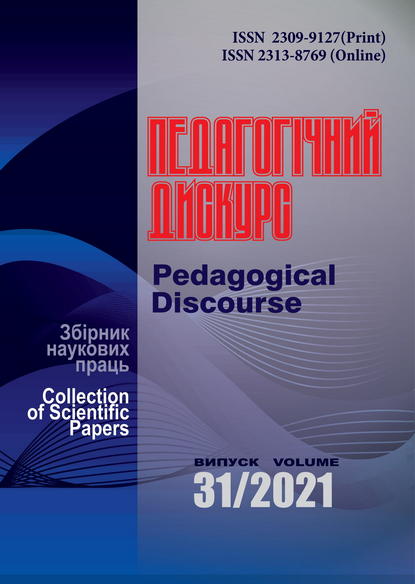Continuity in the «College-University» System in the Training of Future Primary School Teachers on the Basis of Praxeological Approach
Abstract
The article considers the issue of continuity in the training of future primary school teachers on the basis of a praxeological approach in the "college-university" system. The main purpose of the study was chosen - to determine the possibilities of ensuring the continuity of learning in the conditions in this system. The task of this study was set: to analyze and specify the features of continuing education in the «college-university» system; identify the main ways to ensure the continuity of education in the system under study. To achieve the goal a set of methods was used: theoretical; empirical; methods of mathematical statistics. It is determined that the concept of «continuity» has been considered by many scholars from a psychological and pedagogical point of view. We have come to the conclusion that «continuity» should be understood as a regulator of a person's transition from one stage of his development to another, which ensures the strength of the connection of units of different levels. The works of scientists present a model of ensuring and achieving continuity in the level of education, which consists of: methodological foundations; theoretical foundations; creation of information environment; analysis of the continuity principles impact effectiveness; diagnosing continuity.
In our experiment, we implemented the principle of continuity using the disciplines «Ukrainian language for professional purposes» (studied at the college) and "Methods of teaching language and literature education (Ukrainian language) (studied at the university). They fully provide a combination of new forms of organization and activities with the old ones. Taking into account the interdisciplinary connections allows to focus on the development of knowledge, skills and abilities not only on the previous stage of learning, but also on those knowledge, skills, abilities that are related to the unit of language studied in other sections of the course.
Thus, the principle of continuity affects the readiness of college graduates for the educational process at the university. Its use ensures the formation of the professionalism of the future specialist.
Downloads
References
Baller, E. A. (1969). Preemstvennost’ v razvitii kultury’ [Continuity in the Development of Culture]. Moskva: Nauka. [in Russian].
Bartosh, O. P. (2014). Deyaki aspekty profesiinoi pidhotovky maibutnikh sotsialnykh pratsivnykiv na zasadakh prakseolohichnoho pidkhodu u vyshchykh navchalnykh zakladakh Ukrainy [Some Aspects of Professional Training of Future Social Workers on the Basis of Praxeological Approach in Higher Educational Institutions of Ukraine]. Naukovyi visnyk Uzhhorodskoho universytetu. Ser.: Pedahohika. Sotsialna robota – Scientific Bulletin of Uzhhorod University. Ser.: Pedagogy. Social Work, 34, 14–21. [in Ukrainian].
Brushlinskij, A. V. (1979). My’shlenie i prognozirovanie: Logikopsihologicheskij analiz [Thinking and Forecasting: Logical-Psychological Analysis]. Moskva: My’sl. [in Russian].
Vy’gotskij, L. S. (1982). Problemy’ razvitiya psixіki [Problems of the Development of the Psyche]. Sobraniye sochinenij: v 6 t. – Collected Works: in 6 Volumes. Moskva: Pedagogika, T. 3. [in Russian].
Hnativ, Z. Ya. (2017). Muzychna osvita v Ukraini: filosofsko-prakseolohichnyi pidkhid yak metodolohichnyi kontsept doslidzhennia [Music Education in Ukraine: Philosophical and Praxeological Approach as a Methodological Concept of Research]. Filosofski obrii – Philosophical Reviews, 37, 136–143. [in Ukrainian].
Honcharenko, S. U. (2011) Ukrainskyi pedahohichnyi entsyklopedychnyi slovnyk [Ukrainian Pedagogical Encyclopedic Dictionary]. Rivne: Volynski oberehy. [in Ukrainian].
Dodonova, O. A. (2013). Psykholohichna sutnist aktyvnosti osobystosti u protsesi navchannia [Psychological Essence of Personality Activity in the Learning Process]. Teoretychni i prykladni problemy psykholohii – Theoretical and applied problems of psychology, 2 (31), 96–102. [in Ukrainian].
Zagvyazinskij, V. I. (2001). Metodologiya i metody’ psixologo-pedagogicheskogo issledovaniya [Methodology and Methods of Psychological and Pedagogical Research]. Moskva: Akademiya. [in Russian].
Zuev, P. V. (2000). Teoreticheskie osnovy’ povy’sheniya effektivnosti deyatel’nosti uchaschixsya pri obuchenii fizike v srednej shkole [Theoretical Foundations for Improving the Efficiency of Students' Activities in Teaching Physics in Secondary School]: Doctor’s thesis. Sankt-Peterburg. [in Russian].
Kozhevnikov, B. (2008). Nastupnist osvity. [Continuity of Education]. Кyiv: Pleyady. [in Ukrainian].
Levochko, M. T., & Marynenko, Z. V. (2008). Analiz istorychnoho rozvytku nastupnosti v systemi koledzh–universytet [Analysis of the Historical Development of Continuity in the College-University System]. Naukovyi chasopys Natsionalnoho pedahohichnoho universytetu imeni M. P. Drahomanova. Ser. 16 – Scientific Herald of the National Pedagogical University named after M. P. Drahomanov. Ser. 16, 9 (19), 59–63. [in Ukrainian].
Mamardashvili, M. K. (1992). Ideya preemstvennosti i filosofskaya traditsiya. Kak ya ponimayu filosofiyu [The Idea of Continuity and the Philosophical Tradition. How I Understand Philosophy]. Moskva: Gruppa Pro gress, Kultura. [in Russian].
Polishchuk, V. A. (2014). Prakseolohichnyi pidkhid yak innovatsiina osnova vdoskonalennia profesiinoi pidhotovky maibutnikh sotsialnykh pratsivnykiv [Praxeological Approach as an Innovative Basis for Improving the Training of Future Social Workers]. Naukovyi visnyk Uzhhorodskoho natsionalnoho universytetu. Pedahohika, sotsialna robota – Scientific Bulletin of Uzhhorod National University. Pedagogy, Social Work, 32, 148–150. [in Ukrainian].
Rubinshtejn, S. L. (2002). Osnovy’ obschej psixologii [Fundamentals of General Psychology]. Sankt-Peterburg.: Piter. [in Russian].
Copyright (c) 2021 Pedagogical Discourse

This work is licensed under a Creative Commons Attribution-NonCommercial-ShareAlike 4.0 International License.

















